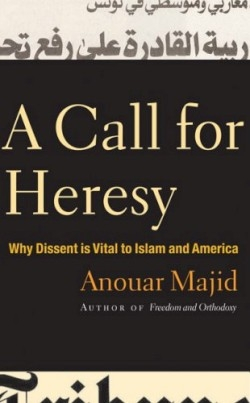A Call for Heresy
Why Dissent is Vital to Islam and America
Recent years have seen no shortage of books offering remedies for the perceived woes of the Islamic world. Most of these—at least the ones receiving attention in the West—focus on the need for Muslims to modernize and democratize or, alternatively, return to the roots of Islam to better prepare for the future. In A Call for Heresy, University of New England Professor of English Majid contends that the Islamic world instead requires the same thing that America now needs: a renewal of heretical tradition.
Displaying an impressive knowledge of Islamic thinkers, from the twelfth century philosopher Averroës to modern Iranian dissident Abdul Karim Soroush, Majid makes a good case both for the richness of heresy in the classical age of Islam and for its relative dearth today. He emphasizes the Sufi mystics, for example, for successfully declaring the advantages of the individual mind and soul over legalistic dogma and restrictive interpretations of Islam. Only the author’s over-reliance on paraphrasing the ideas of others instead of offering more of his own judgments diminishes the value of this section of the book.
Majid does not stop there, however. He also examines the United States, noting that “freethinkers” like Thomas Paine, Ralph Waldo Emerson, and Henry David Thoreau melded dissent and the early American prophetic tradition to capture the magic of the original republican (small “r”) experiment. His assessment that unbridled capitalism and the rise of orthodoxy in political and social thought are leading the United States down a destructive path is sure to spur controversy. Majid’s ease in addressing writers as diverse as Thomas Jefferson and Dinesh D’Souza provides readers a firm foundation for his arguments.
The weakest part of Majid’s presentation lies in his overly hasty condemnation of globalization and call for the complete overhaul of the “current world order.” Without building a full case for his claims, he asserts that globalization hurts everyone but a rich elite—ignoring the benefits that well-managed economic integration has brought to many populations around the world. Regardless, A Call for Heresy illustrates the irony of a declining American society trying to come to the “rescue of a long-sunken one,” Islam. Open-minded readers will gain many insights from Islamic and early American “heretics,” bestowing a rich appreciation for the value that voices of dissent bring to any society.
Reviewed by
David Priess
Disclosure: This article is not an endorsement, but a review. The publisher of this book provided free copies of the book to have their book reviewed by a professional reviewer. No fee was paid by the publisher for this review. Foreword Reviews only recommends books that we love. Foreword Magazine, Inc. is disclosing this in accordance with the Federal Trade Commission’s 16 CFR, Part 255.

